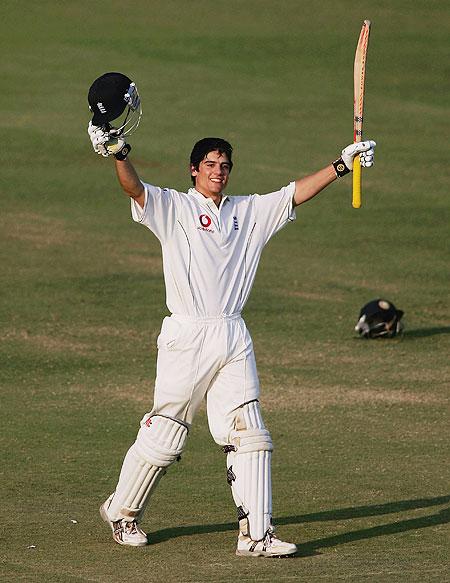 | « Back to article | Print this article |
Three knocks that define Alastair Cook
Bikash Mohapatra looks back on three innings that characterize the resilience of England captain Alastair Cook.
This is an account of three instances I happened to witness. Instances on a cricket field, when three distinct centuries were scored.
Instances that saw the birth of a cricketer, his subsequent rise in stature as a batsman of note and, finally, taking up the mantle of captaincy with elan.
The first instance seems a distance memory.
It was in Nagpur in March 2006.
A 21-year-old, drafted into the England squad as a standby for Marcus Trescothick, was handed a Test debut.
Alastair Cook's inclusion was a bit of a surprise, but the youngster made the most of the opportunity, scoring 60-odd runs in the first innings. He did better in the second, making 104 not out even as England almost secured an improbable victory over India.
His performance, besides announcing his arrival at the international stage in grand style, also made him only the fifth player in history to score a fifty and a century on Test debut.
Scored his career-best vs India at Edgbaston last year
The second instance is more re#162 last year, to be specific.
That debutant of 2006 had become an established opener and was riding high on the success achieved in the Ashes series Down Under and against Sri Lanka at home.
While he won himself the Man of the Series honour against Australia -- even as England retained the urn -- with a series aggregate of 766 runs, England's second highest series scorer after Wally Hammond (906 runs), against Sri Lanka he had had two centuries and 400-plus runs to his credit.
However, against India he struggled at the start.
The opening Test at Lord's witnessed him failing in both the innings. His performance in the second Test at Trent Bridge was equally disappointing. As luck would have it, his underperformance didn't have an impact on the overall result, England winning both the Tests comprehensively to take an unassailable 2-0 lead.
There was pressure on the batsman nonetheless. Instead of succumbing to it, he responded in style, scoring a career-best 294 in the third Test at Edgbaston (Birmingham), a chanceless innings that helped his team win the series.This weekend he proved himself as a great leader
The third and final instance was over the weekend, in the first Test in Motera (Ahmedabad).
It was his first real test as captain -- he was in a makeshift role in the two Tests against Bangladesh in 2010 after Andrew Strauss skipped the series.
England were shunted out for a paltry 191 in their first innings, in response to India's mammoth 521 for eight. A 330-run lead to the home team meant England had been left with two options: perform or perish.
A humiliating defeat was looming large. The morale was palpably down. Inspiration was needed. The captain had the solution. He rose to the occasion and led from the front.
A momentary lapse of concentration -- he was batting well on 41 -- cost him his wicket in the first innings. In the second, he personified concentration, batting for well over five hours to remain unbeaten on 168, making him the first batsman to score centuries in his first three Tests as captain.
England had lost five wickets in their second innings going into the final day. However, the one who started the innings was still standing tall.
The hosts continue to remain in a strong position. But their captain's resilience has given England hope, of an unlikely draw.
The three centuries mentioned above are special.
Nagpur had marked his arrival. Birmingham saw his growth. Ahmedabad witnessed his leadership qualities coming to the fore.
Alastair Cook take a bow.


